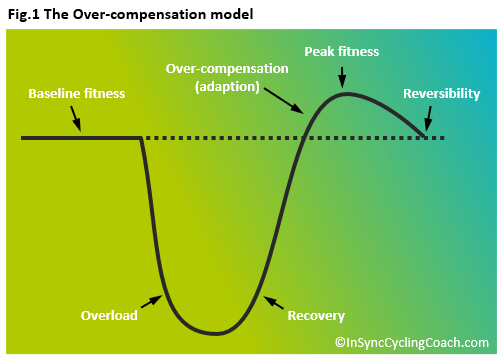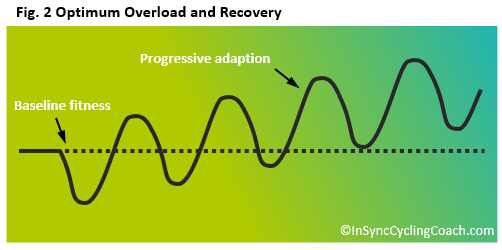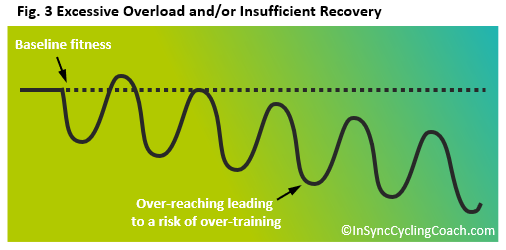What is overtraining and how to avoid it?
Overtraining Syndrome is a state of excessive, prolonged fatigue with a resulting loss of performance which has no other medical explanation. Although the exact causes are unknown, it is bought-on by excessive training and/or inadequate rest and recovery and affects mainly endurance athletes.
In this article we will discuss the definition of overtraining, its effects and symptoms, how to spot the warning signs in order to avoid it. Finally we will touch on what to do if you think you are suffering from overtraining syndrome.
But before we delve into the details we need to take a step back and understand how the body adapts to training:
Fatigue and Adaption
When the body is subjected to appropriate levels of training stimulus it becomes fatigued and subsequently adapts. As the Over-compensation (or Super-compensation) model shows, for the body to adapt to training, it needs a stimulus followed by a period of recovery. The magnitude of the adaption is proportional to the amount of fatigue induced by training. If no further such stimulus is applied, then there will be an eventual return to baseline fitness and the training effect is lost. This is the principle of reversibility.

However if the athlete trains again following adequate recovery, then over-compensation and adaption is reinforced and increased. This continued pattern of fatigue and recovery is how we increase ‘fitness’.

If either the overload is too great or the recovery too little, or a combination of both, then the body moves into a state of Overreaching.

Overreaching (short-term overtraining)
A state of heavy fatigue felt for several days following a prolonged period of hard training is known as Overreaching. Provided the athlete’s workload is sufficiently reduced they will likely recover to resume normal training in a few days. Coaches frequently prescribe blocks of heavy training in order to elicit a large overcompensation effect. Training Camps are a perfect example: typically 4-5 days of hard, back-to-back training followed by a relatively long period of recovery lasting several days. This deliberate strategy is known as Functional Overreaching.
A different kind of overreaching common in self-coached athletes is experienced when the periods of rest following strenuous and repeated training are insufficient for the body to recover and adapt. This unintentional and unwanted effect is known as Non-functional Overreaching.
Overtraining (long term)
If excessive fatigue is repeatedly ignored over a long period this can develop into the more serious condition of Overtraining. Overtraining can be defined as an imbalance between training and recovery, characterised by fatigue and underperformance which fails to disappear with adequate rest. It is has also been referred to as: Burnout, Staleness, or Chronic Fatigue in Athletes.
Budgett (1994) defines overtraining as:
‘…a state of prolonged fatigue and underperformance caused by hard training and competition. There should be an objective measure of the loss of form, which will have lasted at least two weeks despite adequate rest and will have no identifiable medical cause. Symptoms of a minor infection, typically an upper respiratory tract infection, may recur each time the athlete returns to training after inadequate rest.’ (p.465)
So how do you know when you are overtrained or simply overreached?
Lehmann, Foster & Keul (1993) make the following distinction between long-term and short-term overtraining (overreaching):
‘Short-term overtraining lasting a few days to 2 weeks must be differentiated from long-term overtraining over a period of weeks or months since … supercompensation appears to be possible only after short-term and in no case over long-term overtraining’ (p.855)
In other words, your body can recover and adapt if you are overreached such that you require a few days’ rest. If, however, you deny your body that recovery you risk entering a state of Long-Term Overtraining. This requires an even longer period of recovery lasting a few weeks to several months before you can begin to train as normal and return to previous levels of performance.
Effects: How to Spot the Early Signs of Overtraining
Whilst there is no diagnostic test for overtraining, the primary symptom is prolonged (unexplained) underperformance. Whilst the temptation might be to train harder to achieve better performance this must be avoided at all cost. This loss of performance could likely be accompanied by any of the following:
- Poor sleep quality (very common)
- Feelings of depression
- Weight loss
- Lack of appetite
- Increased frequency of illness (particularly respiratory infections)
- Lack of motivation to train
- Loss of libido
- Slow recovery from training
- General irritability
- Suppressed exercising heart rate
- Excessive sweating
- Elevated (and occasionally suppressed) resting heart rate
- Mood swings
It is worth noting that it is not only excessive training loads that lead to overtraining. Other stresses such as poor nutrition, poor hydration or emotional problems may prevent athletes from coping with their normal training loads. Athletes with families and full-time jobs will always find it harder to recover from hard training and racing.
Prevention
Early detection is vital to avoid overtraining but is difficult to self-diagnose since many of the symptoms listed above are common in athletes. That is why I constantly review my athletes’ data and feedback for the warning signs. When conducting an athlete review, I look not only at their empirical data like heart rate and power, but more importantly I review their comments and subjective feedback. Are they finding workouts harder than usual? Is their Feel Good Factor repeatedly low? Are the words ‘tired’, ‘fatigued’ or ‘sore’ cropping up over again in their written feedback?
These are all early warning signs to investigate with the athlete during one-to-one sessions. If I sense that an athlete is becoming overreached, then together we can determine the reasons why and adjust the training, nutrition or recovery strategies accordingly.
Treatment
If overtraining syndrome is diagnosed, then the treatment is lots of rest with very light exercise for a few minutes each day and build slowly over a period of many weeks. Recovery typically takes 6-12 weeks but can be longer in severe cases.
Budgett (1998) suggests exercising daily at a heart rate of 120-140 bpm for only 5-10 minutes at a time and slowly building up to 1 hour per day. Given athletes’ instinctto train hard, they often have to be advised to use another sport so as to break the cycle of partial recovery followed by hard training and recurrent breakdown.
Athletes are often surprised at the performance they can produce after 12 weeks of extremely light exercise, and it is then that care must be taken not to increase training too fast. They need to train hard to go faster, but they must rest and recover completely at least once a week to benefit from all their hard work.
Summary
The overtraining syndrome affects mainly endurance athletes. It is a condition of underperformance, chronic fatigue and an increased vulnerability to infection leading to recurrent illness. The exact causes are not fully understood but occur when an athlete’s training and racing is not balanced by sufficient periods of rest. Careful monitoring of athletes and their response to training is the only known prevention. With a very careful exercise plan and recovery strategies, symptoms normally resolve in 6–12 weeks but may continue much longer or recur if athletes return to hard training too soon.
Are you worried that you are prone to over-training? Why not try our Advanced Training Review and have your training history reviewed by an expert. As well as analytical insights, we will give conclusions and recommendations on how to optimise your training and avoid burn-out.
References
Budgett, R. (1998) Fatigue and underperformance in athletes: the overtraining syndrome. British Journal of Sports Medicine. 32: 107–110
Budgett R. (1994) The overtraining syndrome. British Journal of Sports Medicine. 309:4465–8.
Lehmann, Foster & Keul (1993) Overtraining in endurance athletes a brief review. Medicine & Science in Sports & Exercise: Volume 25, Issue 7: 854-862
